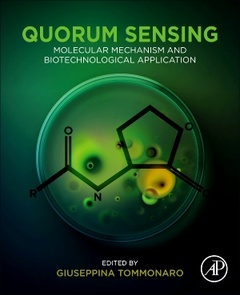Description
Quorum Sensing
Molecular Mechanism and Biotechnological Application
Coordinator: Tommonaro Giuseppina
Language: English
Subject for Quorum Sensing:
309 p. · 19x23.3 cm · Paperback
Description
/li>Contents
/li>Readership
/li>Biography
/li>Comment
/li>
Quorum sensing (QS) is a process of bacterial cooperative behaviour that has an effect on gene regulation. This cell-to-cell communication system involves the production of signalling molecules according to cell density and growth stage. Virulence, the ability to infest a habitat and cause disease, is also governed by such communication signals.
Quorum Sensing: Molecular mechanism and biotechnological application collects, describes and summarizes the most interesting results obtained from experts working on QS mechanisms. It contributes to the understanding of the molecular basis that regulates this mechanism, and describes new findings in fields of application. This volume describes the QS mechanism from its molecular basis to medical applications such as antibiotic therapy and involvement of QS in pathologies. This reference also analyzes its potential use in biotechnological applications such as food packaging, drug delivery, and marine biofilm. The broad scope of this title will be of significant use to researchers across several fields with interest in QS, including to microbiologists, chemists, biochemists and ecologists.
1. GENERAL: CHEMISTRY AND MICROBIOLOGY 1. The Chemical Language Of Gram-Negative Bacteria 2. Analytical approaches for the identification of quorum-sensing molecules 3. Quorum sensing in marine biofilms and environments 4. Quorum sensing in extremophiles
2. INTER-KINGDOM COMMUNICATION 5. Quorum Sensing in Phytopathogenesis 6. Quorum sensing and gut microbiome
3. QUORUM SENSING INHIBITION 7. Enzymatic Quorum Quenching in Biofilms 8. Effect of Polyphenols on Microbial Cell-Cell Communications
4. APPLICATIONS 9. Pseudomonas aeruginosa Quorum Sensing and Biofilm Inhibition
10. Cyclic Peptides in Neurological Disorders: The Case of Cyclo(His-Pro)
Researchers in microbiology, chemistry, ecology, biochemistry including drug delivery, and food including food packaging; Suitable to researchers working in public research bodies within academia or national research councils, and private industry, including in food and pharmaceuticals.
Dr. Tommonaro was involved in the chemical characterization of polysaccharides and biopolymers extracted from bacteria and vegetables. During her research activity, she has developed a sound experience in the isolation and structural elucidation of natural compounds, as well as in the chemical derivation of bioactive compounds to improve the biological activity.
- Describes Quorum Sensing (QS) mechanisms from their molecular basis, to their clinical applications
- Spans several fields in relation to QS, including microbiology, chemistry, biochemistry and ecology
- Considers QS as an approach to the discovery of new antibiotics
- Looks at QS as a means to understand the microbial world and towards use of bacteria and their products in biotechnological applications
- Summarizes key results on QS mechanisms’ molecular basis and fields of application

